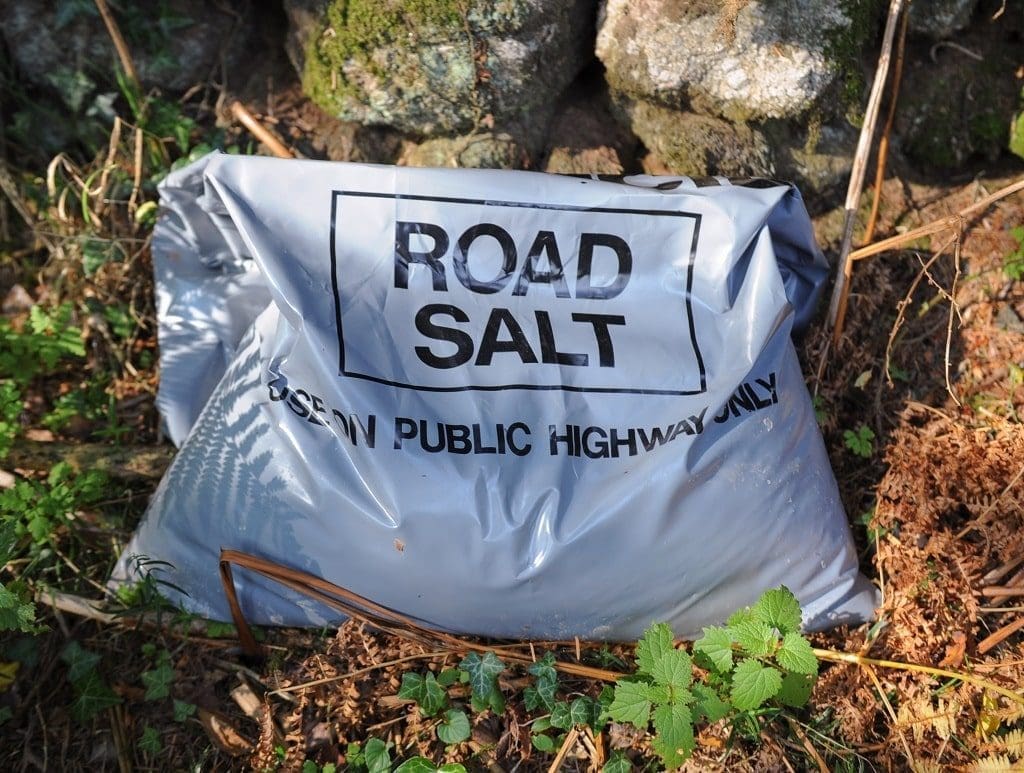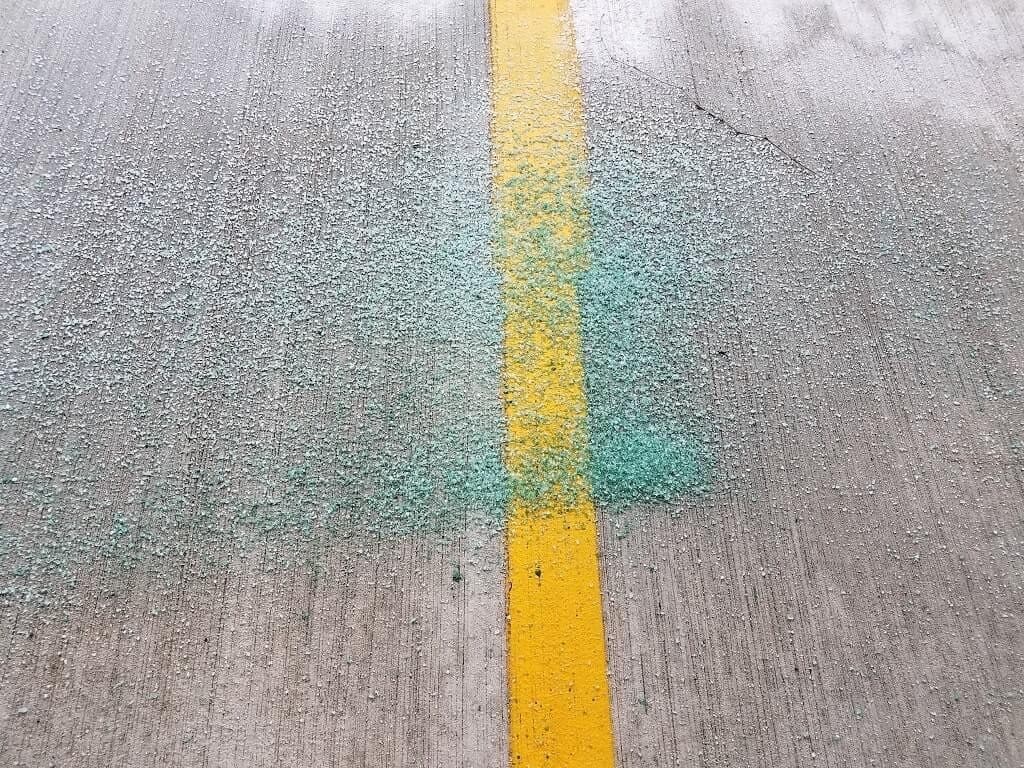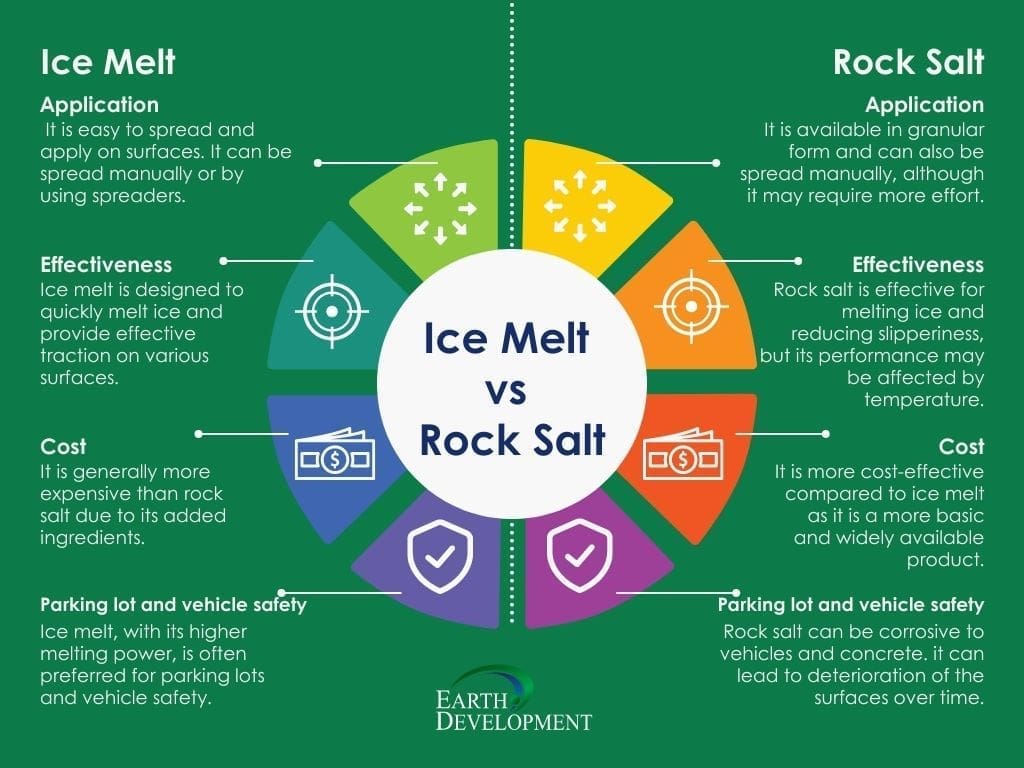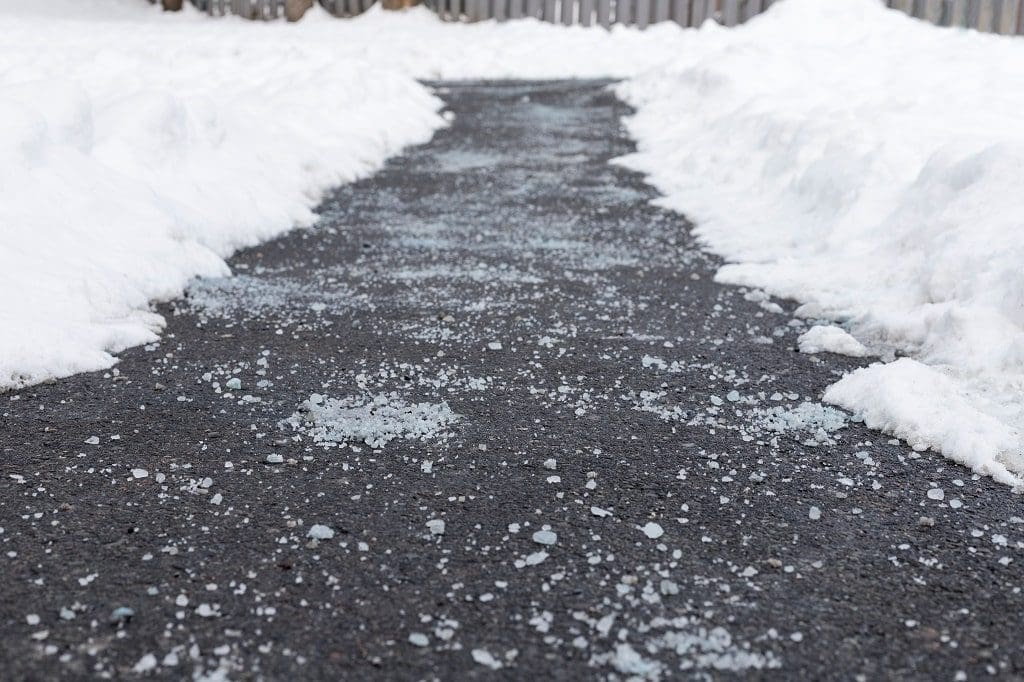When it comes to winter weather safety and clearing those snowy and icy parking lots or driveways, the conversation revolves around one big question: Which is better – ice melt or rock salt? The difference between rock salt and ice melt is in their chemical composition and how they work to melt ice. Our team at Earth Development is here to help guide you through this important topic.
What Is Rock Salt?

Rock salt, also known as sodium chloride (NaCl), is a commonly used de-icing agent and a type of salt that’s used to melt ice and snow. It’s a naturally occurring mineral that is harvested from underground salt deposits. Rock salt is composed of small, granular crystals that are spread on icy surfaces to lower the freezing point of water and facilitate the melting of ice. When applied to snow or ice, rock salt forms a brine solution that melts the ice and helps prevent further ice formation. It’s widely used for de-icing roads, driveways, parking lots, and sidewalks during winter weather conditions.
Pros of Rock Salt
- Effective melting: Sodium chloride rock salt is known for its effectiveness in melting ice and snow, providing improved traction and safer surfaces.
- Cost-effective: Rock salt is generally more affordable compared to other de-icing agents, making it a cost-effective choice for snow and ice management.
- Widely available: Rock salt is readily available in large quantities so it’s easily accessible for snow removal and de-icing operations.
- Easy application: Sodium chloride can be spread manually or with mechanical equipment which allows for efficient and widespread coverage on surfaces.
- Suitable for various temperatures: Rock salt works well in temperatures above 15°F (-9°C), making it effective in many regions with milder winter conditions.
- Minimal damage to surfaces: When used as directed, rock salt typically causes minimal damage to concrete surfaces and vegetation.
- Long-lasting effects: The residual brine formed by rock salt can help prevent further ice formation and offer longer-lasting results.
Cons of Rock Salt
- Corrosive effects: Rock salt can have corrosive effects on metal surfaces such as vehicles, infrastructure, and equipment.
- Environmental impact: The runoff from rock salt can find its way into water bodies and soil, potentially harming aquatic life and vegetation.
- Limited effectiveness in very cold temperatures: Rock salt becomes less effective as temperatures drop below 15°F (-9°C), requiring alternative de-icing methods in extremely cold regions.
- Tracking indoors: Rock salt can be easily tracked indoors and cause damage to flooring and carpets.
- Harmful to pets and wildlife: Ingesting rock salt can be harmful to pets and wildlife, leading to health issues.
- Limited residual effects: Rock salt doesn’t have long-lasting residual effects, meaning additional applications may be required during prolonged snow and ice events.
- Limited melting capability on thick ice: If there’s thick ice buildup, rock salt may not be as effective and require additional mechanical removal methods.
What Is Ice Melt Salt?

Ice melt, also known as ice melting compound or ice melt pellets, is a chemical formulation designed to melt ice and snow. It typically consists of a blend of various salts, such as calcium chloride, magnesium chloride, or potassium chloride. Ice melt is specifically formulated to work at lower temperatures and provide effective ice-melting capabilities. It’s available in different forms, including pellets, flakes, or granules, and is often applied to surfaces before or during snowfall or freezing conditions to prevent ice accumulation. Ice melts work by lowering the freezing point of water, helping to melt ice and prevent further ice formation.
Pros of Ice Melt
- Effective at lower temperatures: Ice melt is formulated to work in sub-freezing temperatures, making it suitable for colder climates.
- Faster ice melting: Ice melt can quickly break down and melt ice, offering fast results.
- Wide range of options: There are various types of ice melt available which allows for customization based on specific needs and preferences.
- Less corrosive: Compared to rock salt, ice melt is generally less corrosive to surfaces such as concrete and metal.
- Safer for vegetation: Ice melt formulations can be safer for plants and landscaping compared to rock salt.
- Reduced tracking: Ice melt products often leave less residue and are less likely to be tracked indoors, minimizing the risk of damage to flooring and carpets.
Cons of Ice Melt
- Higher cost: Ice melt products can be more expensive compared to rock salt, which can impact the overall cost of snow and ice management.
- Limited effectiveness on thick ice: While ice melt is effective for thin layers of ice, it could struggle to penetrate and melt thicker ice accumulations.
- Potential for environmental impact: Some ice melt formulations may contain chemicals that can be harmful to the environment, especially if they enter water bodies or aren’t used properly.
- Less readily available: Ice melt products may not be as widely available as rock salt, so it’s potentially more difficult to source during periods of high demand.
- Potential for staining: Certain ice melt formulations could have a higher risk of staining surfaces such as concrete or other porous materials.
- Specific application requirements: Some types of ice melt may have specific application instructions or require additional precautions for safe and effective use.
Ice Melt vs. Rock Salt: A Comparison Analysis
Finding the best-performing ice melt is key to battling winter weather and maintaining safe surfaces, and the debate between rock salt and ice melt is common. It’s important that you understand their differences to make the right choice for your needs.
1. Application: When Is the Right Time to Use Ice Melt or Rock Salt?
- Use ice melt if temperatures frequently drop below 5 F.
- Use rock salt for snow if temperatures are frequently above 5 F.
- Always select products with high proportions of calcium chloride, as this compound lowers the freezing point of water the most.
- Use ice melt right before icy conditions and use rock salt during extreme weather conditions.
Easier to Use: Tie
2. Effectiveness: Rock Salt vs. Ice Melt: What Melts Ice Faster?
- Rock salt, or sodium chloride, is generally faster at melting ice due to its chemical composition.
- Rock salt lowers water’s freezing point, causing ice to melt faster.
- Ice melt, which often contains a blend of chemicals like magnesium chloride or calcium chloride, generates heat and speeds up the melting process.
- While ice melt may not be as fast-acting as rock salt, it’s still highly effective in melting ice and providing traction on slippery surfaces.
More effective: Ice Melt
3. Price: Which Is More Cost-Effective Salt for Snow?
When comparing the affordability of ice melt and rock salt, there isn’t a significant cost difference. Both can be purchased for under $50 for a 50-pound bag at most home improvement stores. Rock salt generally ranges from $10 to $20 per bag, while ice melt typically costs between $15 and $35 per bag.
While rock salt may be initially less expensive, it may require a heavier application to achieve the desired results. On the other hand, ice melt can be a more cost-effective choice if frequent de-icing is needed throughout the winter. It can provide better performance with a smaller amount.
More affordable: Rock Salt
4. Parking Lot and Vehicles Safety

One concern when using de-icing agents is the potential damage they may cause to concrete parking lots and vehicles. Here’s what you need to know:
Will Salt Damage My Concrete Parking Lot?
- Rock Salt: Traditional rock salt can be harsh on concrete surfaces, especially if it’s used excessively or if the concrete is in poor condition. It can add to the deterioration of concrete over time, leading to cracks and spalling.
- Ice Melt: Ice melt is generally considered less damaging to concrete than rock salt. However, certain types of ice melt that contain chemicals like calcium chloride or magnesium chloride can still have corrosive effects on concrete if used in high amounts or if left for extended periods.
Which One Is Safer for My Employees’ Vehicles — Rock Salt vs. Ice Melt?
- Rock Salt: While rock salt is effective at melting ice, it can cause corrosion and damage to vehicles. It can accelerate the rusting process and cause damage to the undercarriage, frame, and metal components.
- Ice Melt: Ice melt is typically safer for vehicles as it’s less likely to cause corrosion. However, some ice melt formulations may still have the potential to harm certain vehicle parts if excessive amounts are left on the surface or if there are pre-existing vulnerabilities. Some options can be used even as a pet-friendly ice melt.
To Mitigate Potential Damage, Consider the Following Tips:
- Limit the amount of de-icing agent applied to your parking lot and follow the recommended application rates.
- Promptly remove excess ice melt or rock salt residues from vehicles by rinsing them off or visiting a car wash.
- Regularly inspect your parking lot for signs of damage and address issues quickly to prevent further deterioration.
More safe: Ice Melt
5. Landscaping Safety: Which One Won’t Kill My Landscaping? Which One Is More Eco-Friendly?
Will rock salt kill plants? Sadly, it will, and if used frequently, it can make soil unsuitable for future plant growth. Ice melts coated in magnesium chloride are safer for lawns and animals.

Rock Salt vs. Ice Melt — Dotting the I’s to Rock salt vs. Ice Melt: Which One to Choose
- Rock salt melts existing ice and snow, whereas ice melt prevents ice and snow from forming.
- Ice melt is less corrosive than rock salt but can be equally destructive if not used correctly.
- Rock salt for snow is cheaper. While some ice melt products may more expensive, some are eco-friendly and better to use around pets, children, and plants.
- Rock salt is best if you need a cost-effective solution that offers instant traction on snow and ice.
- Ice melts have different levels of effectiveness in terms of melting temperatures, de-icing capabilities, and environmental risks. Always do your research to ensure you’re buying the most suitable ice-melting products.
What Is the Right Way to Use Rock Salt or Ice Melt?

How to Use Rock Salt on Ice:
- First, shovel as much snow away as possible before applying it to frozen areas.
- The ice will start to melt as soon as the salt is applied.
- Then, brush or shovel away the remaining ice. You can reapply salt as much as needed.
How to Use Ice Melt on Ice :
- Always sprinkle ice melt in layers and use gently when applying to concrete.
- Lay a thin layer before a storm and then another layer during the storm.
- As the snow falls, the salt will melt into a solution, and the snow and ice can be shoveled away.
Some Tips and Warnings Regarding Salt Use
- Salts have a long shelf-life and can be bought in bulk, which can reduce costs.
- Try as best as possible to keep rock salt and ice melt away from lawns and flower beds as they can cause damage.
- Wash your pets’ paws and clean your shoes when you come inside; the chemical components in salt can damage floors and carpets and agitate fur.
- Salt has calcium chloride that can irritate the skin, so be sure to wear gloves when using both products.
Final Thoughts
When it comes to what salt to use for snow, ice melt vs. salt rock, it depends on your budget and whether you need a product that increases traction or a product that melts ice and snow as fast as possible. Eco-friendly and environmental factors will probably also play a part in which product is most suitable for you.
At Earth Development, we use the most advanced ice and snow removal products. Plus, we use the best equipment, and we have the most talented and professional team you could ask for.
If you’re looking for reliable and efficient snow and ice control services, don’t hesitate to contact us. Our knowledgeable team is ready to provide you with a customized solution tailored to your needs. Reach out to us today for a quote and discover how Earth Development can help you tackle your snow and ice challenges this winter and beyond.
